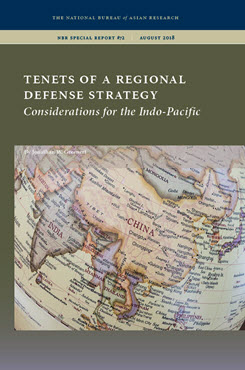by Jonathan W. Greenert
 Of the security concerns in the Indo-Pacific, the challenges are particularly acute in five current hotspots: the Korean Peninsula, the East China Sea, the South China Sea, the India-Pakistan border, and the Taiwan Strait. As the U.S. refines campaign plans in accordance with the National Security Strategy and the classified National Defense Strategy, it is essential that commanders and planners understand the diverse impact of the influence associated with the key players. This diversity is rooted in different levels of national power, approaches to strategic culture, and understandings of national security strategies.
Of the security concerns in the Indo-Pacific, the challenges are particularly acute in five current hotspots: the Korean Peninsula, the East China Sea, the South China Sea, the India-Pakistan border, and the Taiwan Strait. As the U.S. refines campaign plans in accordance with the National Security Strategy and the classified National Defense Strategy, it is essential that commanders and planners understand the diverse impact of the influence associated with the key players. This diversity is rooted in different levels of national power, approaches to strategic culture, and understandings of national security strategies.
IMPLICATIONS
The diversity among the key regional players requires a careful reckoning of each player’s formation of national power, as well as the likelihood and means of using that national power.
As planners assess the diversity in the region, they should embrace that the regional security situation remains complex. Despite potentially transformational political developments on the Korean Peninsula, North Korea is the most pressing national security issue requiring urgent reconciliation on the part of the U.S. and its allies.
The capacity for accumulating power and President Xi Jinping’s somewhat revisionist “China dream” goals make China the greatest long-term security challenge. The country continues to build military and economic power, which it is increasingly willing to use in defense of interests farther afield, driven by economic needs and a populace calling for China to take its proper place in the world.
Long-standing U.S. allies South Korea and Japan are developing important military capabilities to deal with regional security challenges, but they still require strong reassurance from within and deeper military engagement with the U.S.
Indian and Indonesian domestic strategies of autonomy and nonalignment hamper deeper integration with the U.S. The national power possessed by India and Indonesia is more potential than actual, but nonetheless very real and worthy of attention.
As Taiwan faces increased pressure from China, multidimensional U.S. support for Taiwan’s democracy must continue to include a deepening trade relationship and focused diplomatic support, in addition to security assurances and provisions of advanced weapons.
Admiral Jonathan W. Greenert holds the John M. Shalikashvili Chair in National Security Studies at the National Bureau of Asian Research. At NBR, Admiral Greenert informs debates on critical issues in the Asia-Pacific through briefings to congressional members, military, media, and administration officials; meetings with senior-level counterparts in Asia; and research, speaking, and writing. Prior to joining NBR, he served as the 30th chief of naval operations from 2011 to 2015.
No comments:
Post a Comment